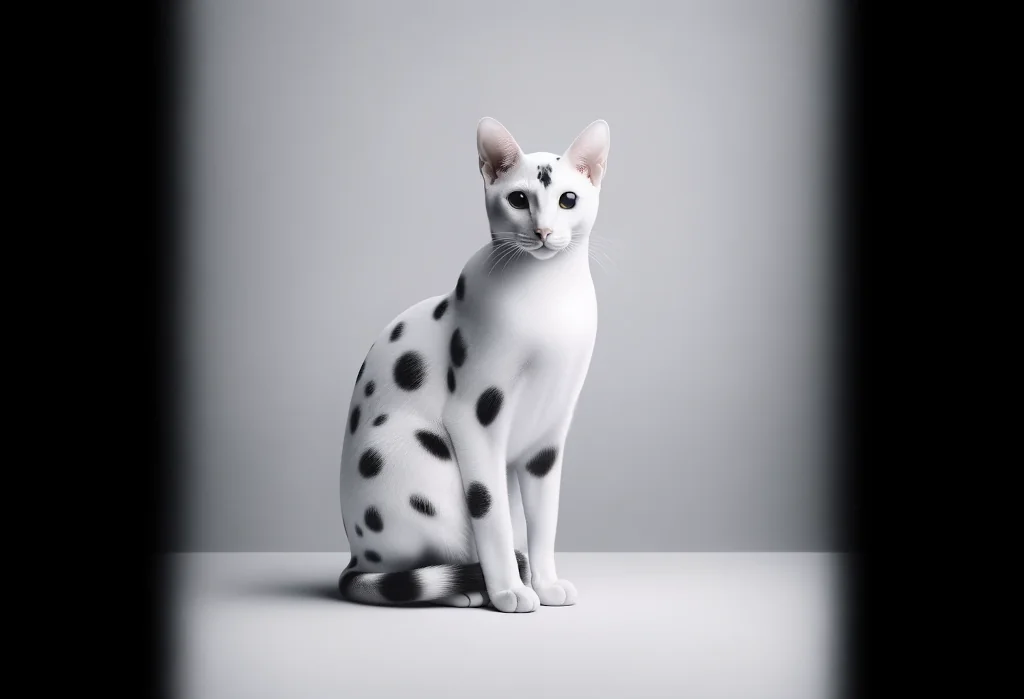Choosing the perfect cat to bring into your home is a bit like selecting a fine wine—appearance matters, and sometimes, you just want something with a unique pattern to grace your living room. If your heart is set on a feline friend adorned in a sophisticated tuxedo of white with black spots, you’re in for a treat, or should we say, a purr-fect match!
In this blog post, you’ll discover breeds that not only boast these eye-catching coats but also carry themselves with the kind of charisma and charm that would make any cat lover swoon.
Quick Takeaways:
- White cats with black spots, featuring in breeds like the Turkish Van, Japanese Bobtail, and British Shorthair, bring unique charm and personality to your home.
- Regular grooming, sun protection, and diet play key roles in maintaining the health and vibrant coat colors of these distinctive felines.
- Health concerns like hearing impairments and skin issues vary by breed, not coat color; preventive care and regular vet visits are essential.
What’s So Special About White Cats With Black Spots?
White cats with black spots aren’t just striking in appearance; they encapsulate a mystique that’s as old as time.
Imagine a feline sauntering through your garden, its pristine white coat dotted with night’s essence. Beyond their charming aesthetics, these cats often carry with them an air of uniqueness — both in personality and health aspects. While some folks might think it’s all about the looks, the truth runs deeper.
The coat pattern of a cat can indeed influence its demeanor. For instance, many believe that cats with unique coat patterns, like our white and black spotted friends, tend to have more vibrant and spirited personalities. But it’s not all about personality quirks; their health can also be tied to their coat’s genetics. For example, cats with white fur and blue eyes might have a higher propensity for deafness. That said, it’s this blend of beauty, mystery, and the touch of science that makes white cats with black spots so special.
Can Any Cat Breed Have White With Black Spots?
Let’s talk genetics. You might wonder if the eye-catching white coat with black spots is an exclusive feature of certain pedigreed princes and princesses or if it’s a whimsical trick of nature that any cat, regardless of breed, can flaunt.
Here’s the scoop: the color and pattern of a cat’s coat are determined by genetics, and while some breeds are predisposed to certain patterns, nature enjoys throwing a curveball or two. This means that yes, theoretically, any cat, including the beloved domestic shorthair that rules your home with an iron paw, can sport a white coat with black spots. It’s a testament to the rich tapestry of feline genetics where dominant and recessive genes play a role in the myriad coat patterns we adore. However, it’s worth mentioning that some breeds have been fine-tuned by humans to exhibit specific colors and patterns more consistently.
Which Breeds Are Known For Their White And Black Spotted Coats?
Diving into the diverse world of feline breeds, several stars are known for wearing their white coats with black spots like a badge of honor. Let’s get to know some of them:
-
Turkish Van : Often hailed as the swimming cat, the Turkish Van loves water and is famous for its unique “Van pattern” where color is confined to the head and the tail, leaving the rest of the body a sparkling white. This breed’s love for a splash combined with its distinctive coat pattern makes it a fascinating companion.
-
Japanese Bobtail : With its rich history and cultural significance in Japan, the Japanese Bobtail features a variety of coat patterns, including the adorable white with black spots. These cats are as spirited as they come, known for their playful demeanor.
-
British Shorthair : While the British Shorthair is often associated with its plush blue coat, this breed can indeed flaunt a white coat with black spots. Known for their calm and easygoing nature, British Shorthairs wearing this coat pattern offer the perfect blend of elegance and companionship.
Here’s a unique tidbit for our readers: not all black spots are created equal. In some cats, what appears to be solid black spots might actually be a rich tapestry of dark colors, a phenomenon known as “ghost striping.” It’s a subtle detail that showcases the complexity and beauty of feline coats. This quirk is often missed but adds an extra layer of allure to these already captivating creatures.
Remember, while breed can give us a hint about a cat’s personality, each cat is an individual. Their unique experiences and genetics blend to create a companion like no other. Whether you’re enchanted by the regal bearing of the Turkish Van, the historical charm of the Japanese Bobtail, or the plush demeanor of the British Shorthair, there’s no denying the allure of white cats with black spots.
How Do You Care For Cats With White And Black Coats?
Caring for cats with the striking white and black coats isn’t just about keeping them looking good – it’s about ensuring their health and happiness too. While these kitties will turn heads with their distinctive coloring, they might need a little extra TLC to keep their coat shining and their skin healthy.
Grooming Needs:
Regular grooming is vital. These cats often love the attention grooming brings, so make it a bonding experience. Brush their fur at least twice a week to prevent matting and reduce shedding. For long-haired breeds, daily brushing might be necessary. A de-shedding tool is invaluable here, especially during the change of seasons when they’re losing their winter coat.
Baths should be an occasional treat, not a regular ordeal. Cats are famously self-cleaning, but a gentle, cat-specific shampoo can remove dirt that their tongue can’t. Pay attention to the ingredients to prevent skin irritation.
Skin Issues:
White fur doesn’t offer much protection from the sun, which means these cats can be susceptible to sunburn, particularly on their ears and nose. Consider using a vet-recommended sunblock for cats on sensitive areas during sunny days.
Another point to note is that white fur can sometimes hide skin conditions, so regular checks are essential. Look out for redness, bumps, or signs of discomfort, which could indicate a problem.
Preserving Coat Color:
Believe it or not, diet plays a huge role in the health and color of a cat’s coat. Foods rich in Omega-3 and Omega-6 fatty acids can promote a shiny, healthy coat. Specialized cat foods for skin and coat health might be a good option to consider.
Interestingly, direct sunlight can cause the black spots on their coats to fade. If you’d like to preserve the deep, rich colors, providing shaded areas for outdoor activities is a smart move.
Unique Insight :
Did you know the water you use for bathing might affect your cat’s coat color and health? In areas with hard water, minerals can deposit on the fur, causing it to become dull and more prone to tangling. Using filtered or distilled water for baths can keep the fur softer and the colors brighter.
Are White Cats With Black Spots Prone To Health Issues?
The notion that a cat’s fur color is linked to its health has circulated for years, but it’s crucial to separate fact from fiction. While it’s true that certain breeds may be predisposed to specific conditions, attributing these solely to coat color can be misleading.
Debunking Myths:
First off, let’s bust a myth. There’s no solid evidence suggesting that cats with white and black coats are more prone to health issues than their solid-colored or differently patterned peers. Health predispositions are more accurately traced to breed rather than coat color.
Health Issues To Watch For:
That said, certain conditions are worth being aware of, not because of their coat color but due to the specific breeds these colors often appear in. For instance: – Hearing Impairments: Many believe white cats, especially those with blue eyes, are prone to deafness. While there’s a correlation, it’s not an absolute rule. It’s breed and gene-specific, not color-specific. – Skin Cancer: Cats with lighter coats are at a higher risk for sun-related skin issues, including cancer. This is especially true for areas where their skin is exposed, like the tips of their ears and nose.
Ensuring a Healthy, Happy Life:
Providing a loving and care-focused environment is the best way to keep your white and black spotted friend healthy. Regular vet checkups, a balanced diet, and plenty of exercise will go a long way. Also, be vigilant for any signs of health issues, no matter how minor they may seem, and address them promptly with your vet.
Remember, while the beauty of white with black spots might catch your eye, it’s the joy and companionship these felines offer that truly makes them special. Loving care tailored to their needs will ensure they remain a striking part of your life for as long as possible.
Alex, a passionate animal lover, has experience in training and understanding animal behavior. As a proud pet parent to two dogs and three cats, he founded AnimalReport.net to share insights from animal experts and expand his knowledge of the animal kingdom.





